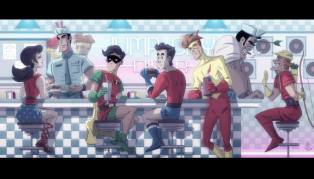When Mrs. Robin and I decided to home school our children (late 90’s until about 2010 or so), our American History curriculum included attending some “Living History” events. Sometimes just a day trip to listen to a speech by a reenactor portraying a significant historical figure, sometimes a visit to a pioneer village to see what life was like, and sometimes even a full weekend trip to watch a battle reenactment.
We and the kids had so much fun doing it that we all became “Living Historians” ourselves – the kids included! Our son (now grown with a family of his own) was Tom Sawyer sort of pioneer boy who liked to show other kids how to get water from the well and rake the garden – and then sit back while his eager “students” did all his chores for him! My daughter hosted classes in the pioneer schoolhouse and would tolerate no misbehavior or disrespect from her students! “The little schoolteacher” became very popular during Pioneer Days and “Ocali Cracker” Days when we lived in Ocala, Florida.
Now as adult reenactors, we haven’t forgotten the value of our role in educating kids. It’s challenging and immensely rewarding. It’s still the reason I do Living History – to pass along the lessons and values of American patriots from our past. In a time when statues are being torn down and symbols of America’s founding and growth as a civilization; at a time when history books skip over major events because they “may be offensive to some,” it’s all the more important that we not shy away from facts and lessons that may be uncomfortable but from which we should gain much wisdom.
I thought it useful to suggest some questions to have children ask living historians at these events, to help glean a better sense of the time, the culture, and the reasons for the events being studied. Since most of what I do nowadays is from the War Between the States (the official and more accurate name for what is commonly called “America’s Civil War”), I’ll use “civil war” examples. Most of these suggested questions are plagiarized from other private school and home school groups, and aimed at clarifying things you often don’t find in books or classes taught in “woke” classrooms and government-run schools.
ASSIGNMENT: Talk to at least one Union soldier, one Confederate soldier, a Chaplain, a Surgeon or Nurse, and one other civilian, preferably a lady, who is not a speaker at the event. Write down their answers to these questions.
SOLDIERS:
What is your name?
What Unit are you with?
Why did you join the Army (or Navy)?
What do you think is the reason for this war?
How can you fight to defend slavery (Confederate) or to conquer our State (Union)?
What name do you call this war?
What battles have you fought in?
What did you eat yesterday?
CIVILIAN:
What is your name?
Why are you with the Army?
How are you supporting the soldiers? How has this war changed your life?
SURGEON:
Other than surgery, what else do surgeons have to deal with?
What schooling do you need in order to be a surgeon?
Visit the “Towne” if the event has one and consider:
Why are there so few men around?
Why is salt more important than money?
What were some of the chores that kids had to do?
What are some of the games that kids played?
How do you make [fill in the blank: butter, bread, a blouse, etc]?
Name something you learned about either the Union or Confederate flags.
What might be the best and worst things about being a soldier in camp?
The “winner” gets to tell the story his or her way. Don’t neglect to at least hear the other side of the story. Also, it’s all too easy to judge a past culture by the same cultural norms that we have today. Consider how the people thought and what values they had back in the Antebellum South or the city-dwelling North at the time.
I hope other home schoolers will find this helpful!
